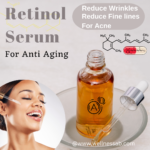
Introduction
Table of Contents
Overview of Facial Serums
Facial serums are potent skin treatments designed to deliver concentrated doses of active ingredients directly into the skin. Unlike traditional moisturizers, serums are lightweight and composed of smaller molecules, allowing them to penetrate deeper into the skin layers. This deep penetration makes serums incredibly effective at targeting specific skin concerns such as wrinkles, dehydration, and dullness.
Importance in Skincare Routines
Incorporating a facial serum into your skincare routine can significantly enhance your skin’s overall health and appearance. Due to their high potency and targeted action, serums can address various skin issues more effectively than other skincare products. Whether you’re looking to combat signs of aging, boost hydration, or achieve a brighter complexion, there’s a serum tailored to meet your needs.
Types and Categories
Anti-Aging Serums
Anti-aging serums are formulated with ingredients that help reduce the appearance of fine lines, wrinkles, and other signs of aging. Common ingredients include retinol, peptides, and antioxidants, which work together to promote collagen production and skin renewal.
Hydrating Serums
Hydrating serums are designed to replenish moisture in the skin, making them ideal for dry and dehydrated skin types. Key ingredients like hyaluronic acid and glycerin attract and retain moisture, resulting in plumper, more hydrated skin.
Brightening Serums
Brightening serums target hyperpigmentation and uneven skin tone. Ingredients like vitamin C, niacinamide, and licorice root extract help to lighten dark spots and give the skin a more radiant appearance.
Exfoliating Serums
Exfoliating serums contain ingredients like alpha hydroxy acids (AHAs) and beta hydroxy acids (BHAs) that gently remove dead skin cells. Regular use can lead to smoother skin texture and a more even complexion.
Acne-Fighting Serums
These serums are formulated to combat acne by reducing inflammation, unclogging pores, and killing acne-causing bacteria. Common ingredients include salicylic acid, benzoyl peroxide, and tea tree oil.
Antioxidant Serums
Antioxidant serums protect the skin from environmental damage caused by free radicals. Ingredients like vitamin C, vitamin E, and ferulic acid neutralize free radicals, helping to prevent premature aging and skin damage.
Peptide Serums
Peptide serums contain short chains of amino acids that help to stimulate collagen production and improve skin elasticity. They are beneficial for reducing the appearance of fine lines and improving overall skin texture.
Custom Serums
Custom serums are tailored to address specific skin concerns based on individual needs. These serums are often formulated with a combination of active ingredients to provide a personalized skincare solution.
Here are , 10 essential morning beauty habits to always look your best
Key Ingredients in Facial Serums
Hyaluronic Acid
Hyaluronic acid is a powerful hydrating ingredient that can hold up to 1000 times its weight in water. It helps to retain moisture in the skin, resulting in a plumper and more hydrated complexion.
Vitamin C
Vitamin C is a potent antioxidant that brightens the skin and reduces the appearance of dark spots and hyperpigmentation. It also stimulates collagen production, improving skin firmness and elasticity.
Retinol
Retinol, a form of vitamin A, is renowned for its anti-aging properties. It accelerates cell turnover, reduces fine lines and wrinkles, and improves overall skin texture.
Salicylic Acid
Salicylic acid is a beta hydroxy acid that exfoliates the skin and unclogs pores. It is particularly effective in treating acne and preventing future breakouts.
Niacinamide
Niacinamide, also known as vitamin B3, is a versatile ingredient that improves skin barrier function, reduces inflammation, and minimizes the appearance of pores.
Peptides
Peptides are short chains of amino acids that promote collagen production and improve skin elasticity. They help to reduce the appearance of fine lines and wrinkles.
Antioxidants
Antioxidants like vitamin E, green tea extract, and ferulic acid protect the skin from environmental damage and prevent premature aging.
Benefits of Facial Serums
Some of the benefits of facial serums are :
Enhanced Hydration
Facial serums with hydrating ingredients like hyaluronic acid and glycerin provide intense moisture to the skin, helping to keep it plump and hydrated. This is particularly beneficial for those with dry or dehydrated skin.
Improved Skin Texture
Regular use of facial serums can improve the overall texture of the skin. Ingredients like retinol and exfoliating acids promote cell turnover, resulting in smoother, more even skin.
Reduction of Fine Lines and Wrinkles
Anti-aging serums containing ingredients like retinol, peptides, and antioxidants can help reduce the appearance of fine lines and wrinkles. These ingredients stimulate collagen production and improve skin elasticity.
Brighter Complexion
Brightening serums with vitamin C, niacinamide, and other lightening agents can help to even out skin tone and reduce the appearance of dark spots, giving the skin a more radiant and youthful appearance.
Minimized Pores
Certain serums, particularly those with niacinamide and salicylic acid, can help to minimize the appearance of pores. These ingredients work by reducing sebum production and unclogging pores.
Acne Prevention and Treatment
Acne-fighting serums with salicylic acid, benzoyl peroxide, and tea tree oil can help to prevent and treat acne. These ingredients reduce inflammation, kill acne-causing bacteria, and unclog pores.
Enhanced Absorption of Other Products
Facial serums are designed to penetrate deeply into the skin, making them an excellent base for other skincare products. Applying a serum before your moisturizer can enhance the absorption and efficacy of both products.
Application and Usage Tips
How to Choose the Right Serum
Choosing the right serum depends on your skin type and concerns. For dry skin, opt for hydrating serums with hyaluronic acid. For aging skin, look for anti-aging serums with retinol and peptides. For acne-prone skin, choose serums with salicylic acid and niacinamide.
Proper Application Techniques
To apply a serum, dispense a small amount onto your fingertips and gently pat it onto your face and neck. Avoid rubbing or pulling on the skin, as this can cause irritation.
When to Apply Serum in Your Routine
Serums should be applied after cleansing and toning but before moisturizing. This allows the active ingredients to penetrate deeply into the skin without being blocked by heavier products.
Combining Serums with Other Products
You can use multiple serums in your skincare routine, but it’s essential to layer them correctly. Apply the thinnest serum first and allow it to absorb fully before applying the next one. Avoid using serums with conflicting ingredients, such as retinol and vitamin C, at the same time.
Common Mistakes to Avoid
- Using too much serum: A little goes a long way, so use only a few drops.
- Applying serums too frequently: Follow the instructions on the product packaging to avoid overuse.
- Ignoring sun protection: Some serums, particularly those with retinol, can make your skin more sensitive to the sun. Always apply sunscreen during the day.
Frequently Asked Questions (FAQs)
What is a facial serum?
A facial serum is a skincare product with a high concentration of active ingredients designed to target specific skin concerns. They are lightweight, fast-absorbing, and penetrate deep into the skin.
How do I choose the right serum for my skin type?
Choose a serum based on your skin type and specific concerns. For dry skin, opt for hydrating serums with hyaluronic acid. For aging skin, look for anti-aging serums with retinol and peptides. For acne-prone skin, choose serums with salicylic acid and niacinamide.
Can I use multiple serums at once?
Yes, you can use multiple serums in your skincare routine. However, it’s essential to layer them correctly, starting with the thinnest serum and allowing each one to absorb fully before applying the next.
Are serums suitable for sensitive skin?
Many serums are formulated for sensitive skin, but it’s essential to check the ingredients list and perform a patch test before using a new product. Look for serums with soothing ingredients like aloe vera and chamomile.
How often should I apply a serum?
The frequency of serum application depends on the product and your skin type. Some serums are suitable for daily use, while others, particularly those with potent active ingredients like retinol, may be used less frequently.
What is the difference between a serum and a moisturizer?
Serums are lightweight and packed with active ingredients that penetrate deep into the skin, targeting specific concerns. Moisturizers are thicker and help to lock in moisture, providing hydration and a protective barrier on the skin’s surface.
Can serums be used on the body?
While facial serums are formulated for the delicate skin on the face, some can be used on the body to target specific concerns such as pigmentation and dryness. Always check the product instructions before applying to larger areas.
Conclusion
Recap of Benefits
Facial serums are an essential addition to any skincare routine, offering targeted treatment for a variety of skin concerns. Their lightweight, fast-absorbing formulas allow for deep penetration of active ingredients, resulting in enhanced hydration, improved texture, reduction of fine lines and wrinkles, a brighter complexion, minimized pores, and effective acne prevention and treatment.
Final Thoughts and Recommendations
Incorporating a facial serum into your daily skincare regimen can yield significant benefits for your skin’s health and appearance. Choose a serum that addresses your specific skin concerns and apply it consistently for the best results. Remember to follow proper application techniques and combine serums with complementary products to maximize their efficacy. With regular use, facial serums can transform your skin, leaving it looking radiant, youthful, and healthy.











